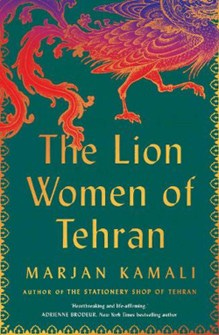The Lion Women of Tehran: Fierce Friendships, Lost Dreams, and the Power of Choosing Again
If you love historical fiction that transports you—utterly and completely—The Lion Women of Tehran by Marjan Kamali deserves a place at the top of your stack.
I finished this one in a soft ache of silence, the kind that only follows a book that quietly broke your heart and pieced it back together—just not in the same order. Kamali’s novel is rich, deeply felt, and quietly powerful. It’s for anyone who’s ever had a friendship that shaped them, a home they had to leave behind, or a version of themselves they couldn’t quite become.
Set in 1950s Tehran, Told Through the Eyes of Two Women
We meet Ellie and Homa—teenage girls in Tehran, drawn together by ambition, idealism, and a yearning for something more. Ellie is wealthy, privileged, and constrained by her family’s expectations. Homa is fierce, determined, and burns with a desire to change the world.
They dream together. They plan their futures. And then—life intervenes.
When politics, class, and gender expectations collide, the girls are torn apart. One escapes to America. The other stays and pays a devastating price for her convictions. And decades later, a chance encounter in New York forces both women to confront what they lost—and what they still carry.
This Is a Story About So Many Things…
Yes, it’s historical fiction. But it’s also about:
The brutal, beautiful intensity of teenage girlhood
What it means to leave your home country behind
How women navigate sacrifice, loyalty, and reinvention
That particular kind of grief reserved for the lives we almost lived
Marjan Kamali writes with such warmth and clarity. The setting is richly drawn—Tehran in the 1950s feels vivid and cinematic, and so does the Iranian diaspora experience decades later. If you read her earlier novel The Stationery Shop, you’ll recognise that same emotional depth and attention to place, but The Lion Women of Tehran feels even more urgent.
The Power of Choosing Again
What really stayed with me, though, was the book’s quiet insistence that we can always choose again. That even in the aftermath of betrayal, loss, or exile, there is still space for reclamation. That friendship can survive time, distance, and deep, deep hurt.
And maybe this is a spoiler (but not really): there’s no big, cinematic reunion scene. This isn’t a story of dramatic apologies or tying everything in a bow. It’s quieter than that, more honest. It’s about showing up, holding space, and recognising that some bonds never really leave us.
For Readers Who Love…
The Island of Missing Trees by Elif Shafak
The Stationery Shop (of course)
Quiet but gut-wrenching stories of friendship, migration, and memory
Books that pair heartbreak with hope
Final Thoughts
This is a novel for fans of historical fiction who don’t just want to learn what happened—but to feel what it meant. It’s beautifully told, with fully realised characters and a slow-burning emotional pull. And while the title might sound grand and sweeping, the story is as intimate and human as it gets.
I loved it. I think you might too… because life is too short to read bad books.


